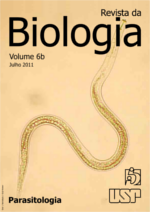Antigenic diversity and immune evasion in malaria parasites
DOI:
https://doi.org/10.7594/revbio.6b.06Keywords:
Antigenic variation, malaria, antigenic diversity, PlasmodiumAbstract
Clinical immunity against blood stage malaria is achieved only after multiple infections with the same species. A major reason for this is the extense diversity of antigens located at the parasites surface or even at the surface of the infected red blood cell. There are two sources for antigenic diversity: first, there is allelic polymorphism with the existence of different and genetically stable versions of antigen encoding genes, generated through mutations and recombination. The second source is antigenic variation, a mechanism by which different antigens are expressed successively without change of the underlying genotype (Ferreira and col., 2007). Herein, we discuss the mechanisms and origins of diversity and antigenic variationDownloads
Download data is not yet available.
Downloads
Published
2018-04-23
Issue
Section
Revisão
License
We ensure that our journal does not retain any copyright and that these are exclusive of the author(s) of the text. In that sense, we intend to break any restrictions to the published material and to achieve more intensely our goal of communicating science.
How to Cite
Ferreira, M. U., Carlos, B. C., & Wunderlich, G. (2018). Antigenic diversity and immune evasion in malaria parasites. Revista Da Biologia, 6(2), 26-31. https://doi.org/10.7594/revbio.6b.06






